Ghyczy’s Family Business Grows Up
Historia de la marca de Alyn Griffiths
Swalmen, Holanda
18.11.14
In a world where an overabundance of consumable products leads to a throwaway culture and fleeting trends, Dutch-based furniture producer Ghyczy is pioneering an alternative by developing timeless designs that combine innovative engineering with craft skills. Led by legendary designer Peter Ghyczy, the family-run company aims to create furniture with lasting value that can be passed on to future generations.
The products from Ghyczy’s Citizens of the World collection display the technical ingenuity of designer Peter Ghyczy combined with classic materials that lend them a timeless appeal
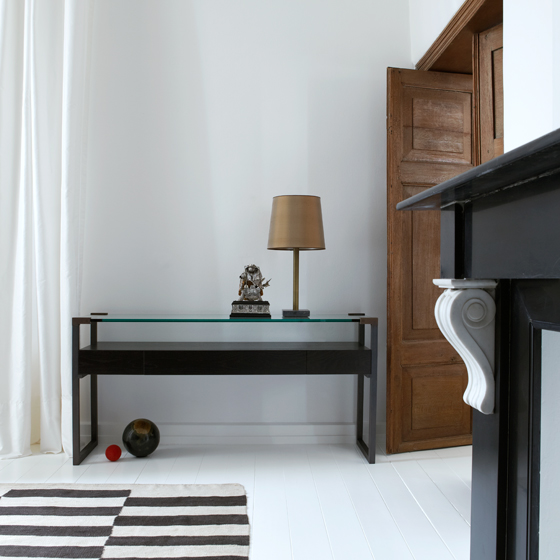
The products from Ghyczy’s Citizens of the World collection display the technical ingenuity of designer Peter Ghyczy combined with classic materials that lend them a timeless appeal
×At the grand age of 73, Hungarian-born designer Peter Ghyczy still spends a few hours each day sketching ideas for new products at the offices of the family firm in the Dutch town of Swalmen. The man who is famous for creating the polyurethane Garden Egg chair in 1968 – and whose work features in the collections of some of the world’s leading museums – remains driven by a determination to improve the quality of living environments around the world by developing furniture that combines elegant forms with robust, honest materials.
The key to understanding Ghyczy’s passion for quality and refined style can be found in his aristocratic upbringing and five decades of experience working in the furniture industry. Born in Budapest in 1940, he spent time in Belgium while still a child. After the crushing of the Hungarian Revolution in 1956, his family fled to Austria and then to West Germany. Ghyczy studied sculpture at Düsseldorf’s Art Academy and architecture at Aachen University before accepting the post of director of the design department at plastics manufacturer Reuter in Lemförde. It was there that he created the Garden Egg chair as a showpiece for the company’s new polyurethane material. The curvaceous design with a flip-up lid became an icon of Pop culture and led Rolf Fehlbaum of Vitra to approach him about setting up a design centre for his new company, but in 1972 Ghyczy left Germany for the Netherlands to launch a studio to produce his own innovative furniture.
Each of the products in Ghyczy’s collection can be custom-made in a variety of sizes, materials and finishes to suit different interior schemes
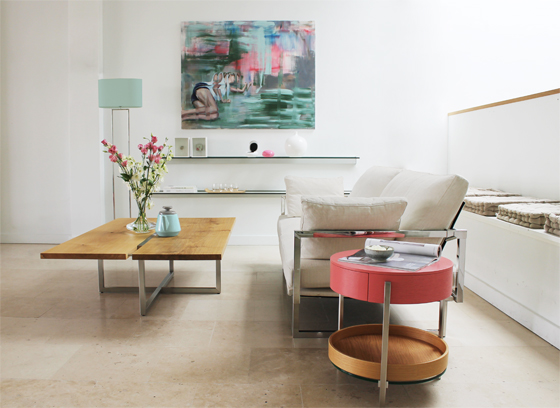
Each of the products in Ghyczy’s collection can be custom-made in a variety of sizes, materials and finishes to suit different interior schemes
בWhen my father started his own company, he wanted to move away from plastic and trendy design to create products of a lasting value,’ explains Ghyczy’s son Felix, who now manages the business. The fact that Ghyczy still produces many of the designs developed in this early period is a measure of their quality and ingenuity. The T04 table from 1970, for example, was based on a new process enabling the production of thick sheets of float glass that could be held in place by a clamping mechanism to create frameless tables. For the R03 shelf, designed in 1971, Ghyczy employed the Fischer wall plug to allow a thin glass surface to be supported by a minimal aluminium profile. The designer’s ability to identify intelligent applications for new materials and technologies resulted in pieces that still feel as relevant today as when they were first produced, and which regularly command impressive prices at auction or on the second-hand market.
The popularity of these timeless designs provided a solid foundation for a business that now involves a close collaboration between father and son to ensure products are manufactured to the highest standards using the best available materials and processes. Rather than a sprawling collection that changes constantly, the family has chosen to focus on developing a small core range of designs with universal appeal. These can be customised to meet the needs of any interior by specifying different dimensions, materials and finishes. Felix Ghyczy points out: ‘My father designs products to be built from different elements that can be put together according to the client’s wishes.’
The square section of the GP01 sofa’s frame provide a minimal support for soft padded cushions. The angle of the backrest and sitting depth can be adjusted to allow the user to choose the most comfortable position
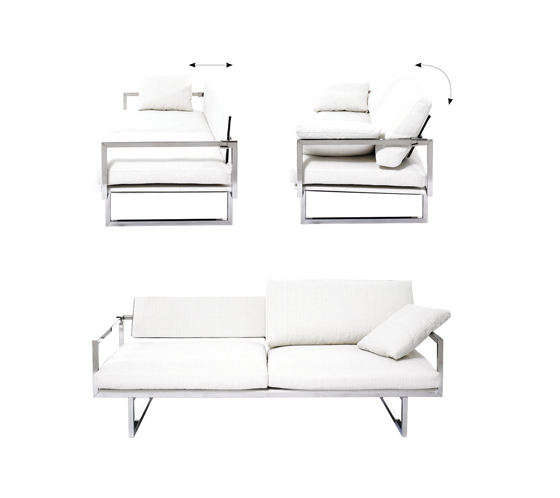
The square section of the GP01 sofa’s frame provide a minimal support for soft padded cushions. The angle of the backrest and sitting depth can be adjusted to allow the user to choose the most comfortable position
×At the recent Biennale Interieur design fair in Kortrijk, Belgium, Ghyczy’s collection, titled Citizens of the World, showcased the latest products alongside some of the company’s enduring classics. The consistent look of the product range is based on clean lines and minimal forms, with each component clearly identifiable. ‘I often find it easiest to say they’re cosmopolitan,’ suggests Felix Ghyczy when pushed to describe the style of the pieces. ‘They’re elegant and luxurious, they’re also minimal and modest, while being very unique with lots of character.’
The S02 chair combines a frame made from stainless-steel pipes with an upholstered seat and backrest that swivels on aluminium hinges to adapt to the sitter’s position
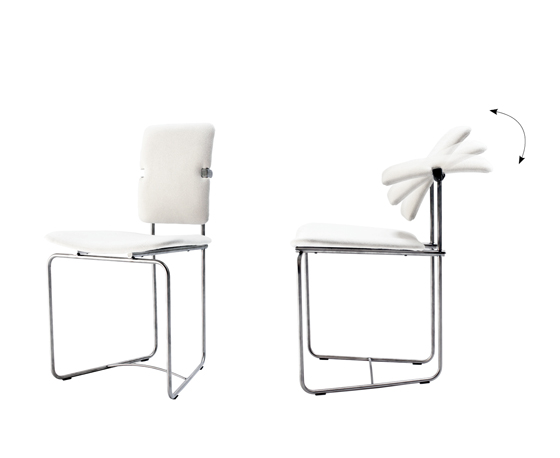
The S02 chair combines a frame made from stainless-steel pipes with an upholstered seat and backrest that swivels on aluminium hinges to adapt to the sitter’s position
×In his role as the company’s creative director, Felix Ghyczy oversees the development of the new pieces to ensure that the values and standards established by his father are retained, while directing the range towards the needs of today’s interior designers and architects. A basic palette of wood, metal and glass is used for the majority of the pieces, and materials are treated in ways that bring out their inherent beauty. Steel, brass and aluminium are sand-cast and left in their raw state or polished, wood is stained or varnished so that the grain still shows through, and glass seems to hover as a result of the elegant clamping system. Fabrics introduced for lampshades and upholstery provide a soft complement to the solidity of the other materials.
In 1970, Peter Ghyczy developed a system for clamping sheets of float glass that has been used to develop a series of minimal yet robust frameless tables
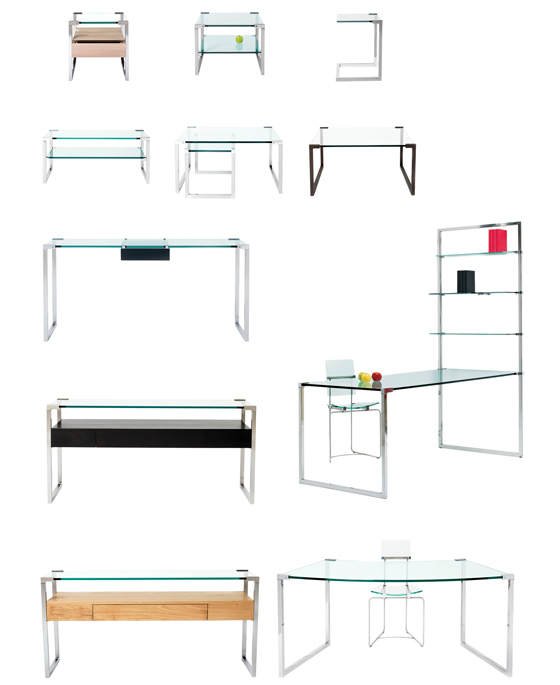
In 1970, Peter Ghyczy developed a system for clamping sheets of float glass that has been used to develop a series of minimal yet robust frameless tables
×Despite their apparent simplicity, each of Peter Ghyczy’s designs has a unique character resulting from the carefully considered details, such as the way materials juxtapose and connect with one another. The T3456 dining table, for example, comprises two planks of solid oak supported by a steel frame that bridges the gap between them at either end and sits flush with the surface. The oak is carefully selected before being dried outdoors for two years and then in a climate-controlled chamber to reach the required level of humidity. It’s this level of care that results in products intended to last a lifetime or even longer.
Two solid oak planks displaying the wood’s natural grain juxtapose with the metal frame that connects them to give the T3456 table a modern feel
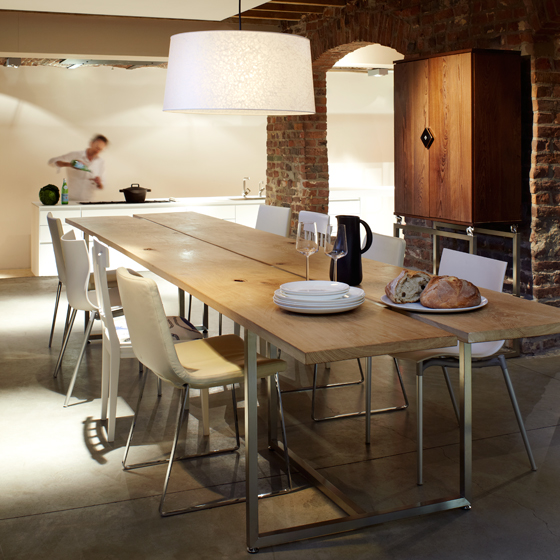
Two solid oak planks displaying the wood’s natural grain juxtapose with the metal frame that connects them to give the T3456 table a modern feel
×Another example of Ghyczy’s ingenuity can be found in the R03 shelf, which features two small screws used to adjust the angle of the glass so that it always remains level. ‘The people who copy this product don’t bother with these screws, so when you put things on the shelf, they’re not straight,’ says Felix Ghyczy, expressing pride in this small but important detail. ‘It’s a very simple solution my father created, which shows his appreciation of construction and engineering.’
A consequence of the company’s dedication to manufacturing a limited product range and treating materials in the most honest and straightforward manner is that it can claim to operate a sustainable business. Materials come from known sources and are processed and assembled in ways that reduce waste, while the designs developed by Peter Ghyczy stem from a personal desire to create products that can be passed down over generations. ‘My father was born in 1940 during the war, when you had to be careful with everything you had,’ Felix Ghyczy explains, ‘so he thinks a lot about the environment and is against the idea of a throwaway culture.’
The R03 shelf is a classic design from 1971 that uses a slimline aluminium profile to support a cantilevered glass shelf
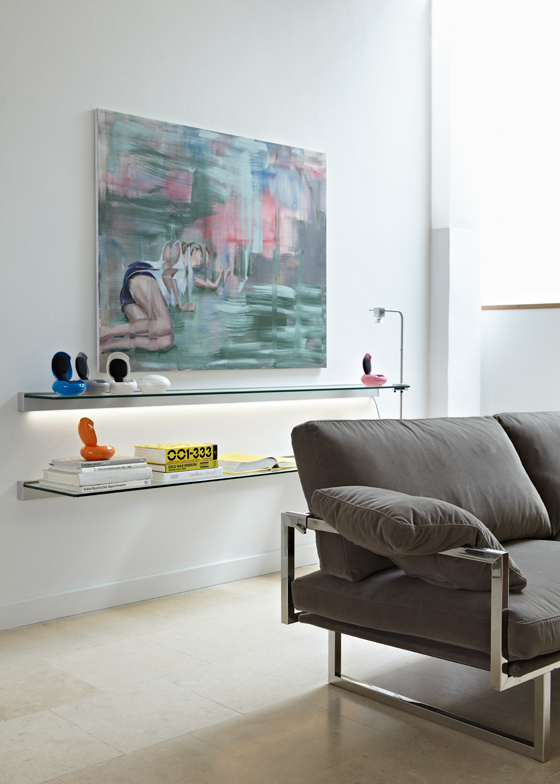
The R03 shelf is a classic design from 1971 that uses a slimline aluminium profile to support a cantilevered glass shelf
×Much has changed in the domestic furniture market since Peter Ghyczy founded his company in 1972, but the products he creates have become increasingly relevant as society faces up to issues such as obsolescence and the unsustainable consumption of finite resources. The challenge ahead for the company is to expand into new regions while maintaining the standards of craftsmanship it has become known for – something Felix Ghyczy is confident they can achieve. ‘I’m positive about the future of this company because the products are cosmopolitan and extremely versatile,’ he declares. ‘I believe there is a market for boutique companies who make customised and characterful products and have a nice story to tell.’ Like the furniture it produces, the story of this family business is already transcending generations.







